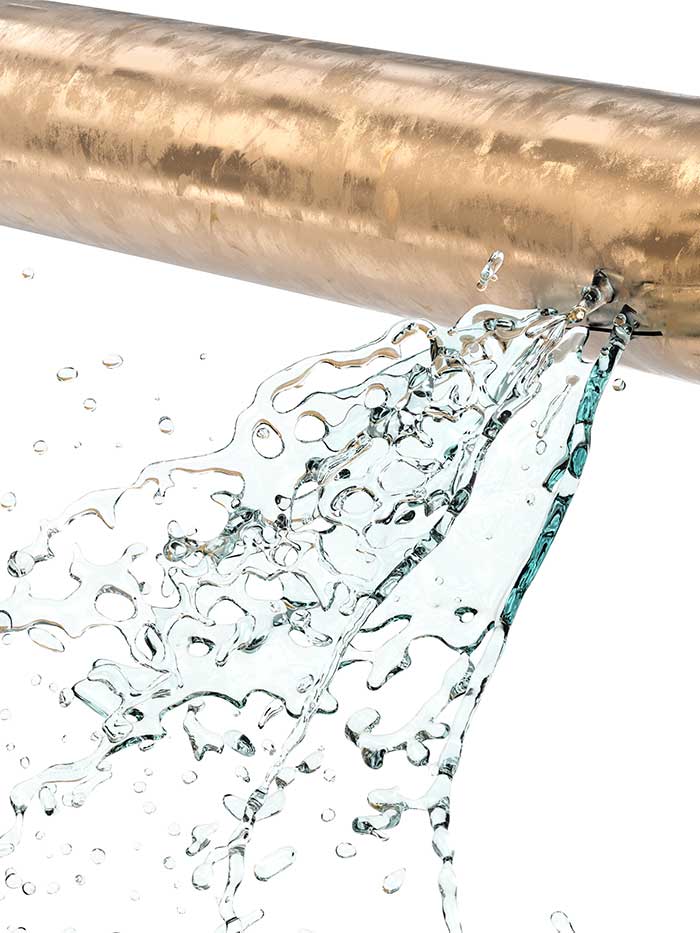
Welcome to TM Hughes & Son Gas Services Ltd. We provide Leak Detection services in Southend and the surrounding areas.
Leak Detection is undertaken by experienced and insured Plumbers who are Gas Safe Registered, so they are qualified to deal with Boilers and heating systems.
What Is Leak Detection?
Water leak detection for homes and businesses involves finding leaks in water supply pipes, plumbing fixtures, and heating systems.
Here are some methods and tools used by our Plumbers for water leak detection in residential and commercial settings:
Visual Inspection
Regular checks for visible signs of leaks, like damp spots, mould, water stains on walls, ceilings, floors, or unexpectedly wet areas in the garden.
Acoustic Leak Detection Machines
These devices listen to the sound of water escaping pipes. They are especially useful for detecting leaks in underground pipes or within walls.
Water Meter Check
Monitoring the water meter for unexpected usage can indicate a leak. This is done by turning off all water-using appliances and fixtures and checking if the meter continues moving.
Thermal Imaging Cameras
These cameras detect temperature differences in walls and floors caused by damp areas.
Pressure Tests
This involves checking the water pressure in the pipes to identify any drops which indicate a leak.
Why You Need Professional Leak Detection Services
Professional Leak Detection Services helps in:
- Preventing Property Damage: Water leaks can cause significant damage to building structures, foundations, and interiors.
- Conserving Water: Detecting and fixing leaks helps save water, which is both environmentally beneficial and cost-effective.
- Avoiding Health Risks: Persistent dampness from leaks can lead to mould growth, which poses health risks.
- Reducing Water Bills: Unchecked leaks lead to higher water bills due to wasted water.
Where Hidden Leaks Occur
Here’s where water leaks in plumbing systems can occur and why:
Pipes Hidden in Walls (Supplying Sinks, Toilets, Appliances, etc)
- Corrosion: Over time, pipes, especially older ones made of metal, corrode, leading to weak spots that eventually give way and leak
- Physical Damage: During building or renovation work, pipes can be accidentally damaged.
- High Water Pressure: Excessive pressure can stress pipes, leading to leaks.
- Temperature Changes: Repeated expansion and contraction from hot and cold water can weaken joints and pipes.
- Clogs and Backups: Blockages can increase pressure in specific spots, causing leaks.
Underfloor Heating Pipes
- Age: Although rare, old underfloor heating pipes can spring a leak.
- Damage: While underfloor pipes are difficult to damage, they occasionally happen during building/DIY work.
- Installation Errors: Improper installation can lead to weak spots prone to leaking.
Underground Water Pipes
- Soil Movement: Shifting soil can pressure pipes, causing them to crack and leak.
- Tree Roots: Roots seeking moisture can invade and damage pipes.
- Corrosion: Soil chemistry can accelerate corrosion in certain pipe materials.
- Age: Older pipes are more susceptible to leaks due to material degradation.
Central Heating Systems
- Corrosion: Oxygen in the water can corrode metal components, leading to leaks.
- Pressure Issues: Faulty pressure valves can cause system pressure to rise, leading to leaks.
- Pump Seals and Joints: Over time, seals and joints can fail.
- Chemical Reactions: Chemical imbalances in the water, like excessive limescale or sludge, can cause pipe damage.
What To Do In The Event Of A Suspected Leak?
If you suspect a leak at home or work, please get in touch. One of our experienced Plumbers will provide you with a free obligation quote and book you an appointment for a visit.
We have the latest tools to find any leaks at your property quickly. Once the leak has been found, we will devise a plan and no-obligation price for a repair.

Hi, I’m Terry the founder and owner of TM Hughes & Son Gas Services
Please get in touch using the Phone Numbers or Contact Form below
Call – 01702 910075
0% Finance
For Boiler Installations & Repair



